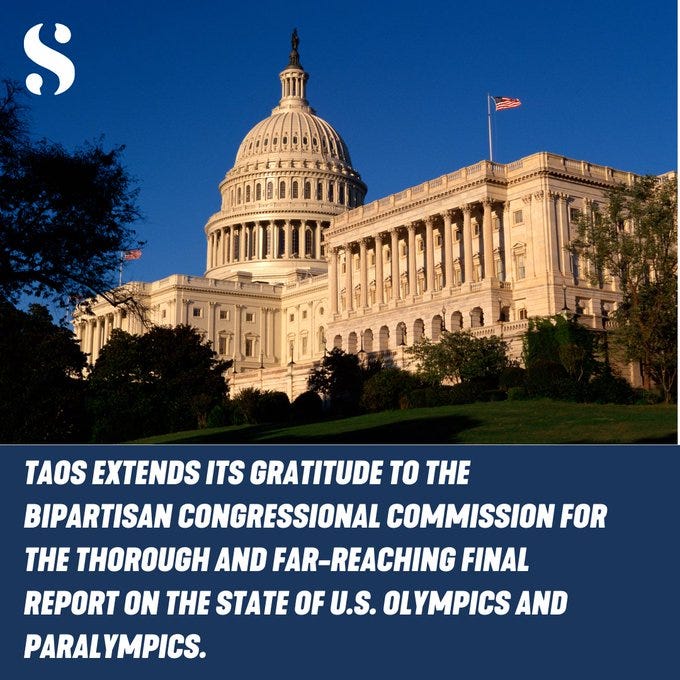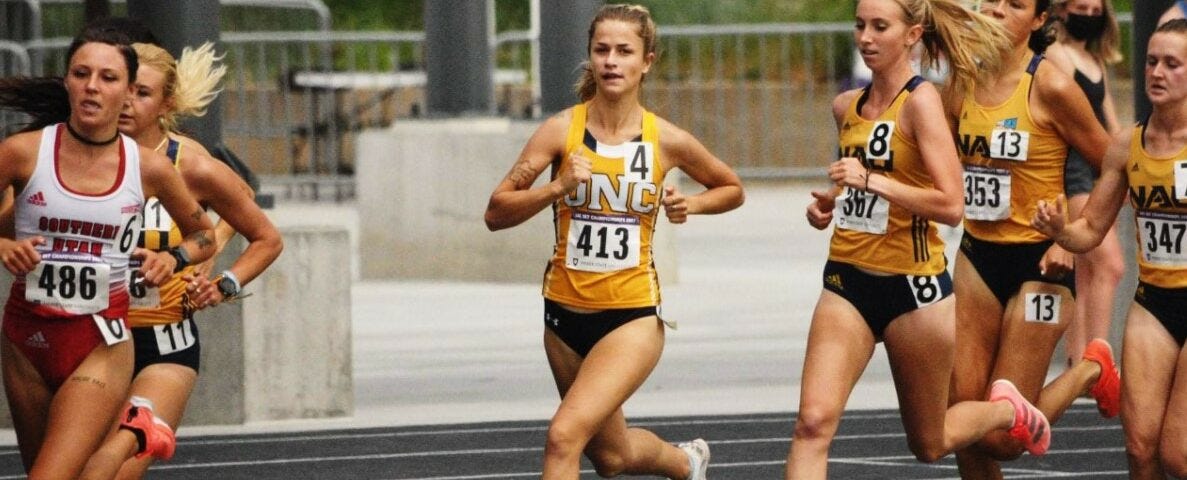“Safer Sports for Athletes Act of 2024"
Recently, I found another publication mentioning the 277-page Final Report of the Commission on the State of U.S. Olympics and Paralympics.
It is from “The Army of Survivors” (TAOS), the nonprofit organization that was founded in 2018 by more than 40 survivors of sexual violence that USA Gymnastics, Michigan State University, the U.S. Olympic Committee, and the FBI enabled.
On their Facebook page, TAOS posted:
TAOS commends the bipartisan Congressional Commission for their exhaustive report on the state of U.S. Olympics and Paralympics. The collective voices of athlete-survivors were not only heard but acted upon, leading to recommended reforms that could reshape the future of athlete safety. In a statement released today, TAOS Founder and President Grace French said, “It was an honor to be part of the hearing process and provide detailed recommendations sharing the experience of athlete-survivors of abuse in sports. I and the athlete-survivors that The Army of Survivors represent recognize the level of detail and coordination this report requires and hope that these recommendations lead to real reforms of the U.S. Center for Safe Sport and broader sports system.”
Read the TAOS statement on that Report
Published on March 5, the TAOS statement mentions:
“TAOS has been working with Congressman Deborah Ross (D-NC) on legislation to make substantial reforms to SafeSport. Tentatively titled the “Safer Sports for Athletes Act of 2024,” this draft legislation would provide concrete measures for Congress to reform SafeSport to be more trauma-aware, improve transparency and communication, prioritize prevention and early intervention strategies, and provide better processes around administrative closures and appeals.”
The CSUSOP Final Report has enabled you to read TAOS President Grace French’s verbal testimony at the CSUSOP hearing (pages 179-180) and her written testimony (pages 230-231).
Read the CSUSOP findings relating to TAOS on pages 64-73.
Of course, the CSUSOP has several recommendations for TAOS-!
Imagine that the teen boy (pictured) was deaf (or hard of hearing). He would dream of becoming a USA Olympian at the 2028 Olympics in Los Angeles or a USA Deadflympian at the 2025 Deaflympics in Tokyo. If former, his expenses to Los Angeles would be handled by the United States Olympic and Paralympics Committee (USOPC.) If so, the teen’s request for the cost to Tokyo would be denied by the USOPC.
Today is the eleventh day after the release of the CSUSOP Report, and I have been pondering if any CSUSOP Commissioners or working staffers HAVE READ the public comment written by the former President of the International Committee of the Sports for the Deaf (and a former resident of Frederick, Maryland), Donalda Ammons.
"To achieve these environments, I resolutely believe it is necessary for Congress and the USOPC to establish funding mechanisms and implement structural reforms—including revising the Ted Stevens Olympic and Amateur Sports Act to insert the Deaflympics alongside the Olympics and the Paralympics so that Deaf and Hard of Hearing Americans are better protected from abuse, mistreatment, and discrimination and are afforded equal access to the provisions of the Act as covered under the Americans with Disabilities Act.
Yesterday, I received an email from a non-deaf athletic trainer serving at the 1977 USA World Games for the Deaf (renamed to Deaflympics in 2001) team in Romania. He exclaimed, “Sadly, this continues as an ongoing quest that never gets off the ground. It seems like a no-brainer to embrace the term Deaflympics and include it in with the paralympic concept with equal rights and benefits! Smells of discrimination, but why?”
When asked why there is so little deaf representation in athletics:
As a former runner of the University of Northern Colorado and a 2022 Deaflympian, Emily Wilson (No. 413) told HearingLikeMe on May 6, 2022:
“We lack representation because so many people quit sports or never try it because of their fear and lack of accommodations. They would rather avoid it altogether. I can’t help but think about how many deaf people are missing out on the experience to be a phenomenal athlete, or a collegiate athlete… not even just within Deaflympics, but as a whole. We deserve to be seen and allowed an equal opportunity to get into sports. The Deaflympics are all about celebrating the hardships deaf people have gone through, the culture and [on] a totally equal world stage where we don’t feel like we are the odd ones out. Instead, we get to be surrounded by thousands of deaf people. Some of us have never met other deaf people. It’s life changing.”
In the CSUSOP Report, the Commission has asked Congress to “study further the challenges faced by deaf and hard-of-hearing athletes and proposals to integrate deaf sports into the U.S. Olympic and Paralympic movement.”
But, today, the Sports Business Journal has cautioned the readers with the following:
With the USOPC and national governing bodies looking ahead to the Paris Games this summer, politicians could use that as a platform to propose legislation. Changes that don’t rely on Congress to act might not get full consideration until the Olympic and Paralympic assembly, which has been pushed back to November because of the Games.





